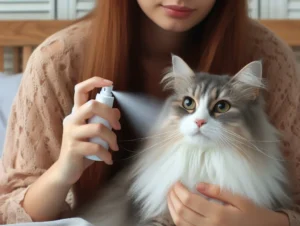Cat allergies can be a nuisance, especially when they seem to worsen at night. If you’ve ever found yourself sneezing and itching more when the sun goes down, you’re not alone. But why exactly do cat allergies seem to flare up in the evening hours?
Your cat allergies may get worse at night due to a combination of factors such as increased exposure to allergens in the air, changes in your body’s immune response, and the way you interact with your cat during the evening hours. Let’s take a closer look at why this happens and what you can do to find relief.
Understanding Cat Allergens
Cat allergens are proteins found in a cat’s skin cells, saliva, and urine. When a cat grooms itself, these allergens can become airborne and settle on surfaces throughout your home. Allergic reactions occur when your immune system mistakenly identifies these proteins as harmful invaders, triggering symptoms such as sneezing, coughing, and itchy eyes.
Cats are prolific groomers, so their allergens can be difficult to avoid. Even if you don’t have a cat at home, these allergens can still be present in public spaces or on the clothes of cat owners. This widespread presence of cat allergens is why people with cat allergies can experience symptoms even in environments without visible cats.
To reduce your exposure to cat allergens, regularly vacuum and dust your home to remove any accumulated allergens. Washing your hands after touching a cat and keeping cats out of bedrooms can also help minimize allergen exposure.
For more in-depth information on managing cat allergens, check out this resource from the American Academy of Allergy, Asthma, and Immunology.
Circadian Rhythms and Allergy Symptoms
Our body’s internal clock, known as circadian rhythms, plays a crucial role in regulating various bodily functions, including the immune response. Research suggests that allergic symptoms, including those triggered by cat allergens, can be influenced by these rhythms.
Allergic reactions may worsen at night due to changes in immune function throughout the day. At night, our bodies produce higher levels of certain immune cells that contribute to allergic responses, potentially intensifying symptoms like nasal congestion and itching.
To help alleviate nighttime allergy symptoms, consider using a HEPA air filter in your bedroom to reduce airborne allergens. Showering before bed can also help wash away any allergens that may have accumulated on your skin and hair throughout the day.
By understanding the connection between circadian rhythms and allergic reactions, you can take proactive steps to manage your cat allergies more effectively, especially during the night when symptoms may peak.
Air Quality in the Evening
Have you ever noticed that your cat allergies seem to worsen at night? Well, part of the reason could be the air quality in your home when the sun goes down. In the evening, factors like humidity and temperature can affect your allergy symptoms. High humidity levels can lead to an increase in mold spores, dust mites, and other allergens in the air, making it harder for you to breathe comfortably. Additionally, as the temperature drops in the evening, pets tend to spend more time indoors, where dander and hair can accumulate, further triggering your allergies. To combat this, consider using a dehumidifier to reduce moisture in the air and regularly vacuuming and dusting your home to minimize allergen exposure. Ensuring good ventilation in your living spaces can also help improve air quality and alleviate your symptoms.
Evening Grooming Habits
Another reason why your cat allergies may flare up at night is due to your feline friend’s grooming habits. Cats are known for their meticulous cleaning routines, often licking their fur to keep it clean. However, this grooming can spread allergens like dander and saliva on their fur, which can then become airborne and trigger your allergies. Not to mention, cats are often more active in the evening, leading to increased shedding and dispersal of allergens in your living spaces. To mitigate this, try to bathe your cat regularly to reduce the amount of allergens on their fur. Additionally, consider creating a designated grooming area for your cat to limit allergen spread throughout your home. By being proactive about your cat’s grooming habits, you can help decrease your exposure to allergens and potentially lessen your allergy symptoms.
Tips for Managing Cat Allergies at Night: 1. Wash your cat’s bedding and toys frequently to reduce allergen buildup. 2. Invest in an air purifier with a HEPA filter to capture pet allergens in the air. 3. Wash your hands and face after interacting with your cat to minimize allergen transfer. 4. Consider using allergy-proof bedding covers and pillowcases to create a barrier against allergens. 5. Consult with an allergist to explore treatment options for managing your cat allergies effectively.
Sleep Disruption and Allergy Flare-Ups
Do you ever feel like your cat allergies are on a mission to ruin your night? Well, disrupted sleep patterns due to allergy symptoms might be the culprit. When your allergies kick in at night, it can make it hard to fall asleep and stay asleep, leading to a vicious cycle of worsening symptoms. The body’s natural response to allergens, like cat dander, can cause nasal congestion, sneezing, and itchy eyes, making it challenging to get the rest you need. As a result, poor sleep can weaken your immune system, making you more sensitive to allergens and intensifying your symptoms. So, next time you’re tossing and turning in bed, blame it on those pesky cat allergies wreaking havoc on your peaceful slumber.
Nighttime Allergy Relief Strategies
Let’s tackle those nighttime cat allergies head-on with some practical tips and strategies for relief. 1. Designate Cat-Free Zones: Create allergen-free havens in your home by keeping your bedroom off-limits to your furry friend. This can help reduce exposure to allergens while you sleep. 2. Invest in an Air Purifier: Consider using a high-efficiency particulate air (HEPA) filter in your bedroom to capture airborne allergens like cat dander and provide cleaner air for easier breathing. 3. Wash Your Bedding Regularly: Wash your sheets, pillowcases, and blankets in hot water weekly to remove allergens and create a fresh sleeping environment. 4. Try Saline Nasal Irrigation: Rinsing your nasal passages with a saline solution can help flush out allergens and relieve congestion, promoting a better night’s sleep. 5. Consult Your Doctor: If your cat allergies are severely impacting your quality of life, speak to your healthcare provider about additional treatment options such as medications or allergy shots.
Remember, a good night’s sleep is essential for overall health and well-being, so don’t let those nighttime cat allergies keep you up at night. Take control with these simple strategies and wake up feeling refreshed and ready to tackle the day ahead.
Mythbusting: Common Misconceptions about Cat Allergies at Night
You might have heard that cat allergies get worse at night because cats become more active or shed more fur during those hours. However, the truth is that allergies can flare up at any time due to various factors. One common misconception is that closing windows at night can keep allergens out, but indoor allergens like pet dander can still linger regardless of the time of day.
Another myth is that closing bedroom doors can prevent cat allergens from spreading, but these particles are small and can easily circulate through the air in your home. Regular dusting and vacuuming are more effective strategies to reduce allergens. Remember, it’s not just about the nighttime; managing cat allergies requires consistent effort throughout the day.
The Impact of Cat Allergies on Overall Quality of Life
Living with cat allergies can be challenging, affecting not only your physical health but also your emotional well-being. Constant sneezing, nasal congestion, and itchy eyes can hinder your daily activities and disrupt your sleep, leading to fatigue and irritability.
In addition to these physical symptoms, cat allergies can also strain relationships with pet owners and limit your social interactions if you avoid places with cats. It’s essential to address your allergies proactively to improve your quality of life and enjoy time spent with pets or in places where cats are present.
- Consulting an allergist to determine specific triggers through testing can help tailor a treatment plan.
- Using air purifiers equipped with HEPA filters can help reduce airborne allergens.
- Washing your hands after petting cats and avoiding touching your face can minimize exposure.
By understanding the impact of cat allergies on your overall well-being and taking proactive steps to manage symptoms, you can improve your quality of life and enjoy a healthier relationship with your feline friends.
Alex, a passionate animal lover, has experience in training and understanding animal behavior. As a proud pet parent to two dogs and three cats, he founded AnimalReport.net to share insights from animal experts and expand his knowledge of the animal kingdom.




